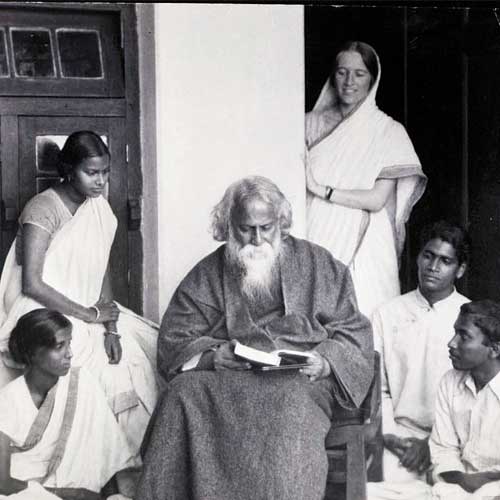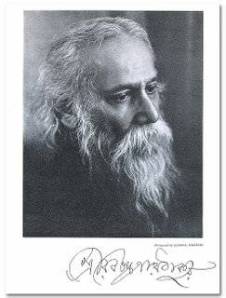Rabindranath Tagore & the vision of Upanishads
I
found a few poems of Rabindranath Tagore in my notes. They express very
beautifully the vision filled of wonder of the person who is awake to
the presence of the Lord in his life, in nature and in himself.
These
poems give us precious clues on how to integrate and assimilate the
teaching of the Upanishads about Isvara, the Lord, in our lives. It is
thus enabling us to be aware of the presence of a Being, to which I, the
world and all human beings are fundamentally ‘connected’ to or in which
all is ‘united’.
Because
in reality, there is only one Being who is, and who is manifest as the
multiple forms of the universe, and who is including me as an
individual. All these forms are always changing within this all
intelligence and power, and are never separated from Him at any time.
To
understand this vision completely, what we have heard from the teaching
has to percolate in the depth of ourselves, go much beyond a superficial
understanding of the concepts of material-intelligent cause or
manifest-unmanifest, maya, etc. The presence of Isvara can indeed become
a reality, a fact we are alive to. There is no place for imagination
here, nor a blind assent to a system of beliefs. But rather a slow
personal work, a process of unveiling, a relation with Isvara which
grows patiently and leads to a silent inner revolution, with
appreciation of the presence of His grace with us all along.
This
particular type of poetry is a real bridge which enables us to see the
presence of Isvara in everything and in our life, when it is allied with
a proper teaching. More I think about it, more I believe that it is
impossible to bypass Isvara if one wants to gain serenity, joy and
ultimately freedom.
The same stream of life that runs through my veins night and day
runs through the world and dances in rhythmic measures.
It is the same life that shoots in joy through the dust of the earth
in numberless blades of grass
and breaks into tumultuous waves of leaves and flowers.
It is the same life that is rocked in the ocean-cradle of birth
and of death, in ebb and in flow.
I feel my limbs are made glorious by the touch of this world of life.
And my pride is from the life-throb of ages dancing in my blood this moment..’
Rabindranath Tagore
Two other poems
belonging to the series of poems by Tagore. They express one of the
essential themes of the Upanishads : the relation that we have with the
world, with others. The first poem gives a striking image of the walls
through which I close myself to what is around me. My subjectivity,
fears, anxieties, arrogance, are indeed invisible but at the same time
tangible walls that I erect between the universe and myself. May this
narrow perspective of the world, which is only self-centered, disappear.
The more objective I am to the presence of what is, the more clarity,
transparency, openness I can enjoy.
How far should I go in
this process of gaining objectivity? Should I disappear totally as an
individual? Is it possible and even desirable? The poet replies in the
second poem: ‘Let only that little be left of me, by which…’
Dungeon
He whom I enclose with my name is weeping in this dungeon.
I am ever busy building this wall all around;
and as thus wall goes up into the sky day by day,
I lose sight of my true being in its dark shadow.
I take pride in this great wall, and I plaster it with dust and sand
at least hole should be left in this name;
and for all the care I take I lose sight of my true being.
Rabindranath Tagore
Little of me
Let only that little be left of me whereby I may name thee my all,
Let only that little be left of my will whereby I may feel thee on everyside,
And come to thee in everything, and offer to thee my love every moment,
Let only that little be left of me whereby I may never hide thee,
Let only that little of my fetters be left whereby I am bound with thy will
And thy purpose is carried out in my life,
and that is the fetter of thy love.
Rabindranath Tagore (Gitanjali)

